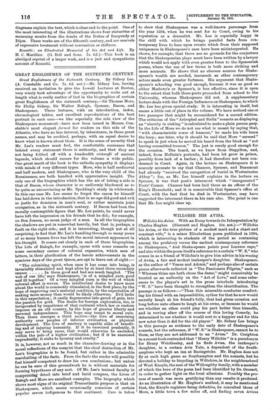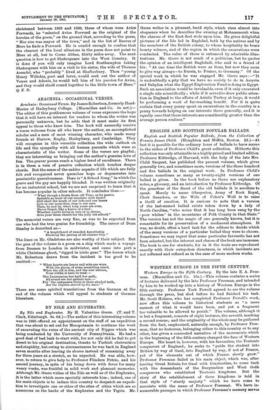Willobie his Avisa. With an Essay towards its Interpretation by
Charles Hughes (Sherratt and Hughes. 10s. net.)—" Willobie his Avisa, or the true picture of a modest maid and a chest and constant wife," is a minor Elizabethan poem published in 1594, which is interesting to students of the period as containing among the prefatory verses the earliest contemporary reference to Shakespeare, " And Shake-spears paints poor Lucrece rape," and also within the poem itself a reference to a certain " W. S." who comes in as a friend of Willobie's to give him advice in his wooing of Avisa, a fair and modest innkeeper's daughter. Shakespeare, as the author of " Venus and Adonis," and perhaps also of certain pieces afterwards collected in " The Passionate Pilgrim," such as " Whereas thine eye hath chose the dame," might conceivably be treated as an authority on the "Art of Love," and some refer- ences to the player's art in the prose interlude introducing " W. S." have been thought to strengthen the identification. The passage is as follows :—" Thus this miserable comforter comfort- ing his friend with an impossibilitie, eyther for that he now would secretly laugh at his friend's folly, that had given occasion not long before unto others to laugh at his owne, or because he would see whether an other could play his part better then himselfe, and in vewing afarr off the course of this loving Comedy, he determined to see whether it would sort to a happier end for this new actor than it did for the old player." Mr. Sidney Lee brings in this passage as evidence to the early date of Shakespeare's sonnets, but the reference, if " W. S." is Shakespeare, cannot be to them, as they are not addressed to an " Avisa." Dr. Creighton in a recent book contended that " Henry Willobie " is a pseudonym for Henry Wriothesley, and he finds Avisa, the innkeeper's daughter, in a certain Avis Yate, a dependent of the South- amptons who kept an inn at Basingstoke. Mr. Hughes does not fly at such high game as Southampton and the sonnets, but he devoted a holiday to bicycling in Wiltshire, in the neighbourhood of West Knoyle, the seat of the Willoughby family, with a member of which the hero of the poem had been identified by Dr. Grosart, in order to gather light on the local allusions. Possibly the pro- cess of search was more gratifying than any results it produced. As an illustration of Mr. Hughes's method, it may be mentioned that, the Knoyle registers being defective, he consulted those of Mere, a little town a few miles off, and finding seven Avices
christened between 1563 and 1599, three of whom were Avice Forwards, he "-selected Avice Forward as the original of the heroine of the poem,” on the ground that, according to the poem, " Her sire was mayor of the town," and in the list of Reeves of Mere he finds a Forward. He is candid enough to confess that the clearest of the local allusions in the poem does not point to Mere at all, but to Cerne Abbas, thirty miles away. The next question is how to get Shakespeare into the West Country. It is done if you will only imagine Lord Southampton taking Shakespeare with him on a visit to his sister, the wife of Thomas Arundel, who " probably " lived at Shaftesbury. Then " young Henry Willobie, poet and lover, would seek out the author of Venus and Adonis, he would tell him of his passion for Avisa, and they would stroll round together to the little town of Mere." Q. E. D.
ARACHNIA : OCCASIONAL VERSES.























































 Previous page
Previous page